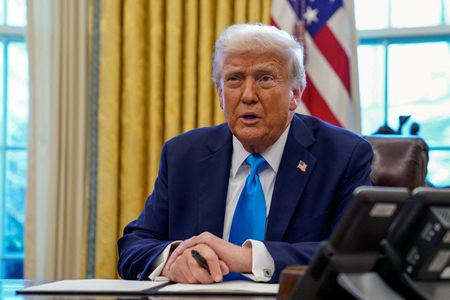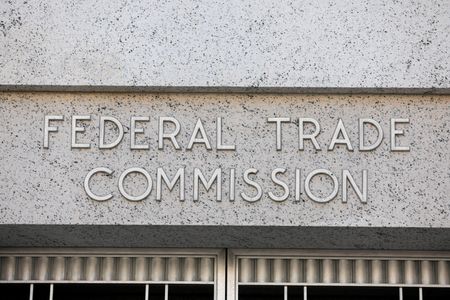By Bo Erickson and Richard Cowan
WASHINGTON (Reuters) – President Donald Trump has placed holds on tens of billions of dollars in congressionally-approved spending for projects across the U.S.
that range from Iowa soybean farmers adopting greener practices to a Virginia railway expansion, a Reuters analysis found.
Project managers and advocates warn continued delays could take a toll on local economies.
Democratic lawmakers say the halts are the building blocks to “impoundment,” presidential refusal to release money authorized and appropriated by Congress, which they say is illegal.
The man Trump has nominated as his budget chief, Russell Vought, has disagreed, saying presidents have the right to withhold spending.
The Republican-majority Senate is expected to confirm Vought on Thursday evening after Democrats staged an all-night session in opposition.
A federal court on January 31 temporarily blocked the Trump administration’s government-wide pause on federal grant funding.
But soon after, the administration argued the president’s directives were still in effect.
Trump’s orders have restrained at least tens of billions of dollars of funding for clean energy projects, conservation initiatives and transportation projects across the country.
Dozens of interviews with grantees in more than 20 states, along with industry managers and experts that track how the federal government distributes its money, captured just a snapshot of federal spending that Trump’s orders continued to freeze.
The Trump administration has not provided an overall estimate of the frozen funding, but thousands of new jobs in communities are at risk, people working on the halted projects said.
“It’s a major concern if this doesn’t get done,” Mike Foley, a Cuyahoga County, Ohio, official who oversees energy projects with more than $100 million in paused funding, said.
“I need to hire engineers and I can’t do that.”
The U.S. Constitution gives Congress the power over federal spending and a decades-old law requires the president to give Congress advance notice of impoundments before taking action.
“We will speak out, we will press this administration, we will open investigations, and we will demand accountability,” Senator Patty Murray, the senior Democrat on the Senate Appropriations Committee.
Republican lawmakers argue the pauses are necessary to give the new administration time to assess what money is being spent on and look for ways to lower the U.S.
deficit.
“The executive branch of government in our system has the right to evaluate how executive branch agencies are operating and to ensure that not only the intent of Congress in funding mechanisms, but also the stewardship of precious American taxpayer dollars, is being handled well,” House Speaker Mike Johnson said on Wednesday.
The initial January 20 White House orders were broad and told federal agencies to “immediately pause the disbursement of funds” from two large bills that were marquee accomplishments of then-President Joe Biden, including a 2021 bipartisan effort.
DISRUPTED FUNDING
The town of Painesville, Ohio, about 30 miles (50 km) northeast of Cleveland, received part of a $129 million climate pollution reduction grant last year to replace its 137-year-old coal-fired power plant.
It would be replaced with solar panels and a battery backup system, but the project and its estimated 200 jobs remains on hiatus because of the funding pause.
“To have the grants paused or frozen is really disrupting and disheartening,” Foley, the project lead, added.
Hundreds of millions of dollars also remain paused throughout Ohio and seven other states ranging from Pennsylvania to Kansas for projects to help around 17,000 lower-income households save on energy costs.
The U.S.
Environmental Protection Agency on Tuesday indicated to some grantees, in a list viewed by Reuters, that only one educational program out of dozens of varying projects funded by the 2022 Inflation Reduction Act that Republicans opposed would likely move forward.
Tom Taylor, senior policy analyst at Atlas Public Policy, a climate think-tank, estimated that thousands of grant recipients could be defunded as a result.
In Virginia, a $2.3 billion “Long Bridge” improvement that would significantly increase passenger and freight railroad service is also in limbo, Democratic Senator Tim Kaine said.
“They seem to be if it happened during the Biden administration we want to pause this, even if it’s doing good in red and blue states,” he told reporters.
REPUBLICAN STATES
Of the approximately $21 billion of funding that could be clawed back by the Department of Transportation, almost $7 billion is directed for projects in states that voted for Trump in 2024, said Corrigan Solerno, the policy manager for the research group Transportation for America.
Trump rescinded the previous administration’s goal of 40% funding to disadvantaged communities, which includes the “climate smart” commodities grants for thousands farmers to implement conservation practices like cover crops.
“This suspension puts the program and its participating farmers at risk,” Brent Swart, the president of the Iowa Soybean Association wrote in a Monday letter to all Republican members of Congress from Iowa, saying farmers involved in this regional project “are contractually owed $11 million for practices implemented in 2024.”
Meanwhile, businesses and local officials find themselves hoping for the best as budget battles rage.
“I try not to get too anxious about things until I know it’s real,” Danville City Manager Ken Larking said of any potential cuts to a $1.3 billion industrial development park just outside of his Virginia town.
(This story has been corrected to change the name to Mike Foley in paragraph 7)
(Reporting by Bo Erickson and Richard Cowan; Editing by Scott Malone and Alistair Bell)











